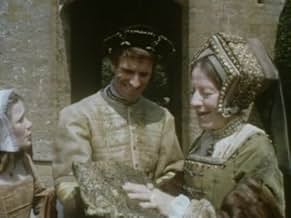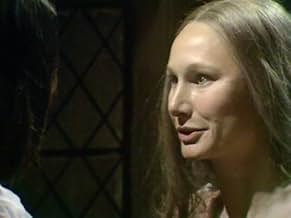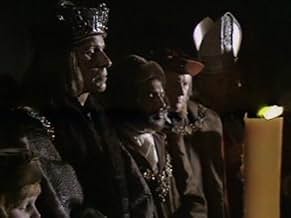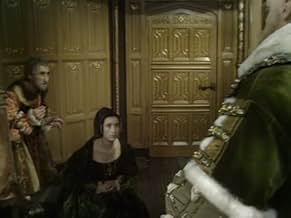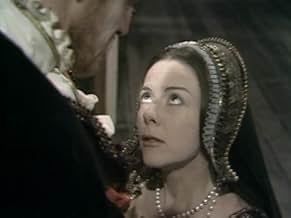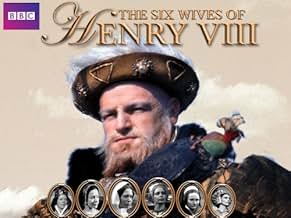The Six Wives of Henry VIII
- Minissérie de televisão
- 1970
- 9 h
AVALIAÇÃO DA IMDb
8,4/10
1,5 mil
SUA AVALIAÇÃO
Adicionar um enredo no seu idiomaA six-episode dramatization of Henry VIII's relationships with each of his six wives. Each episode is devoted to one wife, and is a complete play in itself.A six-episode dramatization of Henry VIII's relationships with each of his six wives. Each episode is devoted to one wife, and is a complete play in itself.A six-episode dramatization of Henry VIII's relationships with each of his six wives. Each episode is devoted to one wife, and is a complete play in itself.
- Ganhou 1 Primetime Emmy
- 7 vitórias e 8 indicações no total
Explorar episódios
Avaliações em destaque
This is a fictionalized biography of England's interesting, overrated and matrimonially challenged monarch of the early sixteenth century. The Renaissance--secularism, self-assertion, democratic elections and the relegation of otherworldism--had been introduced as a set of ideas negative to church-worldly theocracy in 1470 by Edward IV. Henry VIII's era's nobles then followed a fashion set by him; female costume was thin, confining, geometric and dull. Henry's male costume was broad, fur-bearing, opulent and increasingly Italianate. His life and times became a struggle between Medieval statism and individualist Renaissance priorities. The series is titled for the "six wives" he married; but an equal amount of time is spent on Henry's stormy reign. The six wives are "Catherine of Aragon" (Annette Crosbie; "Anne Boleyn" (Dorothy Tutin); "Jane Seymour" (Anne Stallybrass); "Anne of Cleves" (Elvi Hale); "Catherine Howard" (Angela Pleasance, aka Angela Scoular); and "Catherine Parr" (Rosalie Crutchley). The assessment of a nine-hour-long series of such complexity as English history, examples of acting, directing, staging, writing, political theory and psychology is a difficult assignment. It is on the grounds of separate evaluations of these aspects that I say one must approach the series. Henry begins as a conformist but Renaissance-loving youth of unusual promise; by the end of the series he has become a bloated and totalitarian monster. He has wasted the kingdom's exchequer in continental wars and on Medieval-style pageants and tournaments; and his neglect of justice and bequeathing of his kingdom to Bloody Mary Tudor, a Catholic, nearly undoes his life's great achievement, the removal of Catholic influence and monastic structures from England, for good or ill. The presentation of events, personalities, ideas and history here I regard as above-average in sum; at times, one feels one is watching realpolitik coming to life before one's eyes. The physical production is above average though seldom either sumptuous or grand; the richest part of the series is its costumes. The directors bring good performances out of many actors; blocking of action, gestures and scenic elements are always quite high-level, I find. Psychologically, the difficulty in such a six-episode coherently-arranged ninety-minute-each mini-series is to try to make the motivations and reactions appeal to late twentieth-century viewers. The writers of the episodes had varying material to work with, and for the most part handled both historicity as well as psychology with requisite skill, I suggest. The dialogue about political as well as personal consequences in most cases remains interesting, and rather well-handled, by my standards. 1. Catherine of Aragon. This is a rather well-written story which telescopes years of time, from the early marriage of Henry, then a prince, to his brother's affianced wife after his death to the ending of their quarrel after early happiness when Henry divorces himself from her and Catholicism. Annette Crosbie is miscast as a Spanish noblewoman but acts rather creditably throughout the episode. 2. Anne Bolyen. Less time is covered in this episode than in the first, and some backtracking is necessary since the same events are covered from Anne Bolyen's point of view the second time. I find the dialogue and story-line and acting to be the best in this Nick McCarty script of all the series' entries. Dorothy Tutin and Wolfe Morris are excellent in this episode even though she is a bit too old for the part. The highlight is the trial scenes that end with Anne's unjust murder. 3. Jane Seymour. I consider this the weakest of the scripts, although Anne Stallybrass is an effectively tragic figure; Bernard Hepton as Cranmer comes to the fore in this episode as a most effective presence. 4. Anne of Cleves. This charming and very-well-reasoned episode presents Elvi Hale as a delightful and occasionally merry prospective bride for an aging Henry; she became a world-class presence due to this intelligently written part. 5. Catherine Howard. Anglela Pleasence is quite good in this part though neither quite beautiful nor highly-charismatic; she deserved more work off this interesting effort. The script is a strong one, especially in dialogue; and the viewer is given the sense from the beginning that this is a monarch of whom men dare not run afoul. A moving and complex piece of television writing and well-acted, the episode shows that even the mighty Howard family is not impervious to Henry's danger. 6. Catherine Parr. Another episode that telescopes time. Enorrmous by now and dangerous, Henry has become the shadow of what he was; one fears for Rosalie Crutchley, the kindly woman who brightens his last years, for a climate where truth cannot be uttered is no England for honest men, male or female. One must begin any evaluation of the series with with Keith Michell as Henry Tudor. His performance is extraordinarily good, much better than anyone else's in the part has been of which I have knowledge. By playing Henry straight, Michell gave him time to become deviant--in reasoning, willful blindness, denial, cruelty and injustice--by slow degrees. Among the many other actors involved, Sheila Burrell, Christopher Hancock, Patrick Troughton and Zienia Merton among others deserve mention. A landmark when it was produced, the series has only grown in stature since it was first presented.
This series - and can you imagine the BBC financing and supporting a nine-hour historical drama series these days? - focuses on one of the six wives each episode, an interesting approach which comes off better in some instalments than others. Still, what is here is excellent - and far better than the ridiculously truncated film which followed a few years later.
Keith Michell as Henry. What more can I add to the praise which has already been put forward? He is excellent in every episode; we see Henry as a complex character who at times can cause us to sympathise with his predicament. The writing of this series is tight and believable, and the supporting characters are solid. This always helps move a series along when many supporting players are there throughout. Of particular note are Patrick Troughton as Norfolk, Bernard Hepton as Cranmer, and Sheila Burrell as Lady Rochford.
Of the six wives, all are excellent in their own ways. Katherine of Aragon's story is rushed, but Annette Crosbie does her best and is both memorable and pathetic ... Dorothy Tutin as Anne Boleyn is more fiery but the trial scene is truly regal and gives a different perspective ... Anne Stallybrass as Jane Seymour is sweet, pious, and just a little bit cunning (and that episode, largely in flashback as Jane lies sick to death at her son's christening, is well done) ... Elvi Hale as Anne of Cleves is extremely convincing, and her episode is full of intrigue ... Catherine Howard, as played by Angela Pleasance, is all gloss and no substance, but you still feel for her as she goes headlong to her fate without recognition ... and Rosalie Crutchley as Katharine Parr is a dull old crow in black, widow of old men, who at first resents her lot and then comes to respect and love the sick king.
This series really is remarkable. I would never get bored watching it - and eventually, it led to another top-class BBC drama, Elizabeth R, using some of the same cast and moving the story through the reigns of Edward VI, Mary I, and Elizabeth I herself.
Keith Michell as Henry. What more can I add to the praise which has already been put forward? He is excellent in every episode; we see Henry as a complex character who at times can cause us to sympathise with his predicament. The writing of this series is tight and believable, and the supporting characters are solid. This always helps move a series along when many supporting players are there throughout. Of particular note are Patrick Troughton as Norfolk, Bernard Hepton as Cranmer, and Sheila Burrell as Lady Rochford.
Of the six wives, all are excellent in their own ways. Katherine of Aragon's story is rushed, but Annette Crosbie does her best and is both memorable and pathetic ... Dorothy Tutin as Anne Boleyn is more fiery but the trial scene is truly regal and gives a different perspective ... Anne Stallybrass as Jane Seymour is sweet, pious, and just a little bit cunning (and that episode, largely in flashback as Jane lies sick to death at her son's christening, is well done) ... Elvi Hale as Anne of Cleves is extremely convincing, and her episode is full of intrigue ... Catherine Howard, as played by Angela Pleasance, is all gloss and no substance, but you still feel for her as she goes headlong to her fate without recognition ... and Rosalie Crutchley as Katharine Parr is a dull old crow in black, widow of old men, who at first resents her lot and then comes to respect and love the sick king.
This series really is remarkable. I would never get bored watching it - and eventually, it led to another top-class BBC drama, Elizabeth R, using some of the same cast and moving the story through the reigns of Edward VI, Mary I, and Elizabeth I herself.
This is a set I'd love to own. The costumes are great, and acting is even greater, especially Keith Michel. He brings real depth to Henry and we see him as the interesting, complex man that he was, not just the selfish, bloated glutton of his later years. The court intrigue and politics, and also the costumes are expertly presented and you get a real feel for the times. The only flaw was that the actresses were generally too old for the parts they played, but there aren't many young actresses of this caliber, so one has to suspend disbelief and just enjoy the show. If I had to choose the best performance of the wives, I'd choose Annette Crosbie as Catherine of Aragon.
This is one of the most popular and best-remembered BBC drama productions of all time. As well as drawing record audiences in the early seventies, it spawned the equally impressive follow-up - Elizabeth R. The Six Wives of Henry VIII is not held in such high regard without good reason. It is perhaps the most historically accurate dramatic account of this period in history we will ever see.
As well as its accuracy, the series is remembered for the performances of the actors. Keith Michell shines throughout as King Henry aging from an athletic young prince to a monstrously obese tyrant. All of the actresses deliver sterling performances as the wives. Standouts from the supporting cast include Sheila Burrell as the conniving Lady Rochford, Wolfe Morris as manipulative Thomas Cromwell, Patrick Troughton as the Duke of Norfolk and Bernard Hepton as Archbishop Cranmer, a role he was to reprise in Elizabeth R and the 1973 cinema remake of this series.
The costumes and makeup for this series cannot go unmentioned. They are little short of outstanding. One would almost believe Keith Michell was swapped for an older, fatter actor for the latter three episodes and the costumes change throughout, depicting shifts in courtly fashions.
CATHERINE OF ARAGON Perhaps the least lavish play in terms of production values, but among the better ones for scripting and acting. It begins, rather ploddingly, by covering Catherine's time in England before her marriage to Henry. When they do wed, the story skips abruptly to Henry's courtship with Anne Boleyn and the divorce of Catherine. Midway through this episode Anne Boleyn is Queen and Catherine is left dying away from court. It closes with her death in 1536.
ANNE BOLEYN A somewhat disappointing installment, despite wonderful acting and a sharp script. Anne is without a doubt the most famous wife of Henry VIII and the one who has provoked the most interest from historians, yet much of her life goes untold in this series. The earlier events in her story were rushed through in a handful of scenes in the second half of the Catherine of Aragon episode, and this episode focuses entirely on her downfall. Half of this play is dedicated to the last eighteen days of Anne's life, in the tower. Dorothy Tutin's fine performance brings this play back on par with the better ones in the series though.
JANE SEYMOUR Something of an anomaly within this series. It breaks with the continuity of the other five plays by covering events that had already been dealt with in Anne Boleyn's episode. The result is that Anne's execution is depicted twice during the course of the series. It also stands out from the rest in terms of production. The other five episodes are filmed as theatrical pieces whilst Jane Seymour is visibly an example of television drama. It's a shame that perhaps the dullest of Henry's wives gets by far the best treatment in the series. The real mystery of this episode is why the format suddenly changes before reverting back to the old style for the final three installments.
ANNE OF CLEVES It was never going to be easy to write a ninety-minute play about a largely unimportant, six-month-long mistake, but everybody involved seems to have made their best efforts here. Anne of Cleves is interpreted as being far more intelligent and witty than she cared to show in the English court and Elvi Hale plays her well. It's very absorbingly written too.
CATHERINE HOWARD It's difficult to decide what to make of this episode. The script has Catherine as a match for her ill-fated cousin, Anne Boleyn, with cunning intelligence, when she was, in fact, a frivolous girl who was thrust too high for her own good. It is, nonetheless, a good adaptation of her story and Sheila Burrell is fantastic as Lady Rochford. As with all the other episodes, there is a reluctance to paint Henry in a bad light here and Catherine almost comes out as the villain of the piece.
CATHERINE PARR Perhaps the most neglected wife in public interest, Catherine Parr's story is actually full of intrigue. This episode deals with her strong religious views and her enforcement of them which nearly sent her to a grizzly fate. Unlike the others in the series, this play relies heavily on dialogue rather than action and it closes the story well.
So the only real failing of the series is not that it is shown in six episodes, but that one episode is dedicated to each wife. The story could have been told more comprehensively if parts 1-3 dealt with Catherine of Aragon's time as Queen, her fall from grace in favour of Anne Boleyn, the divorce, the religious reforms brought about by the King's desire to marry Anne Boleyn and have her children as heirs to the throne, Anne's marriage to the King and her eventual downfall. Jane Seymour would be best dealt with in part 4, Anne of Cleves and Catherine Howard merged together in the fifth part, whilst Catherine Parr and the King's death could be covered in the sixth.
This criticism aside, the series has earned every word of praise ever spoken for it. It is one of the best nine hours you can spend watching a television drama, so go out and watch it.
As well as its accuracy, the series is remembered for the performances of the actors. Keith Michell shines throughout as King Henry aging from an athletic young prince to a monstrously obese tyrant. All of the actresses deliver sterling performances as the wives. Standouts from the supporting cast include Sheila Burrell as the conniving Lady Rochford, Wolfe Morris as manipulative Thomas Cromwell, Patrick Troughton as the Duke of Norfolk and Bernard Hepton as Archbishop Cranmer, a role he was to reprise in Elizabeth R and the 1973 cinema remake of this series.
The costumes and makeup for this series cannot go unmentioned. They are little short of outstanding. One would almost believe Keith Michell was swapped for an older, fatter actor for the latter three episodes and the costumes change throughout, depicting shifts in courtly fashions.
CATHERINE OF ARAGON Perhaps the least lavish play in terms of production values, but among the better ones for scripting and acting. It begins, rather ploddingly, by covering Catherine's time in England before her marriage to Henry. When they do wed, the story skips abruptly to Henry's courtship with Anne Boleyn and the divorce of Catherine. Midway through this episode Anne Boleyn is Queen and Catherine is left dying away from court. It closes with her death in 1536.
ANNE BOLEYN A somewhat disappointing installment, despite wonderful acting and a sharp script. Anne is without a doubt the most famous wife of Henry VIII and the one who has provoked the most interest from historians, yet much of her life goes untold in this series. The earlier events in her story were rushed through in a handful of scenes in the second half of the Catherine of Aragon episode, and this episode focuses entirely on her downfall. Half of this play is dedicated to the last eighteen days of Anne's life, in the tower. Dorothy Tutin's fine performance brings this play back on par with the better ones in the series though.
JANE SEYMOUR Something of an anomaly within this series. It breaks with the continuity of the other five plays by covering events that had already been dealt with in Anne Boleyn's episode. The result is that Anne's execution is depicted twice during the course of the series. It also stands out from the rest in terms of production. The other five episodes are filmed as theatrical pieces whilst Jane Seymour is visibly an example of television drama. It's a shame that perhaps the dullest of Henry's wives gets by far the best treatment in the series. The real mystery of this episode is why the format suddenly changes before reverting back to the old style for the final three installments.
ANNE OF CLEVES It was never going to be easy to write a ninety-minute play about a largely unimportant, six-month-long mistake, but everybody involved seems to have made their best efforts here. Anne of Cleves is interpreted as being far more intelligent and witty than she cared to show in the English court and Elvi Hale plays her well. It's very absorbingly written too.
CATHERINE HOWARD It's difficult to decide what to make of this episode. The script has Catherine as a match for her ill-fated cousin, Anne Boleyn, with cunning intelligence, when she was, in fact, a frivolous girl who was thrust too high for her own good. It is, nonetheless, a good adaptation of her story and Sheila Burrell is fantastic as Lady Rochford. As with all the other episodes, there is a reluctance to paint Henry in a bad light here and Catherine almost comes out as the villain of the piece.
CATHERINE PARR Perhaps the most neglected wife in public interest, Catherine Parr's story is actually full of intrigue. This episode deals with her strong religious views and her enforcement of them which nearly sent her to a grizzly fate. Unlike the others in the series, this play relies heavily on dialogue rather than action and it closes the story well.
So the only real failing of the series is not that it is shown in six episodes, but that one episode is dedicated to each wife. The story could have been told more comprehensively if parts 1-3 dealt with Catherine of Aragon's time as Queen, her fall from grace in favour of Anne Boleyn, the divorce, the religious reforms brought about by the King's desire to marry Anne Boleyn and have her children as heirs to the throne, Anne's marriage to the King and her eventual downfall. Jane Seymour would be best dealt with in part 4, Anne of Cleves and Catherine Howard merged together in the fifth part, whilst Catherine Parr and the King's death could be covered in the sixth.
This criticism aside, the series has earned every word of praise ever spoken for it. It is one of the best nine hours you can spend watching a television drama, so go out and watch it.
This was one of the most amazing pieces of television/theater. I was 17 when I watched it for the first time and about 10 years ago, acquired the miniseries on VHS. Just recently I was given the DVD set as a gift. I've been re-watching it and I marvel at just how amazing the production and the performances were. At the time Keith Michell played Henry, the actor was in his early 40's yet managed to portray the monarch from age 18 till his death at 56. Simply remarkable and I think Michell is the consummate Henry VIII. As the previous poster, my favorite episodes were Anne Boleyn and Catherine Howard; I didn't know Ms. Pleasence was Donald Pleasance's daughter. I also enjoyed Annette Crosbie's performance; she also portrayed Queen Victoria in the miniseries about Edward VII. All in all, this is one of the finest miniseries ever done on television and I doubt we'll see its equal anytime soon.
Você sabia?
- CuriosidadesKeith Michell was one hundred eighty-eight centimeters (six feet one inch) tall, the same height as the real Henry VIII.
- ConexõesFeatured in The 24th Annual Primetime Emmy Awards (1972)
Principais escolhas
Faça login para avaliar e ver a lista de recomendações personalizadas
- How many seasons does The Six Wives of Henry VIII have?Fornecido pela Alexa
Detalhes
- Data de lançamento
- País de origem
- Idioma
- Também conhecido como
- Die sechs Frauen Heinrich VIII
- Empresa de produção
- Consulte mais créditos da empresa na IMDbPro
Contribua para esta página
Sugerir uma alteração ou adicionar conteúdo ausente

Principal brecha
By what name was The Six Wives of Henry VIII (1970) officially released in India in English?
Responda
